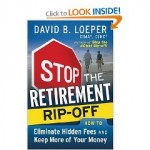Have you wondered how good your retirement accounts are? Is your retirement money getting eaten up by fees you don’t see? With the way the stock market has been the last year many people have seen their retirement portfolio’s nosedive. Many people are no longer confident that their retirement savings will support them. How can you protect your retirement savings so you can live the life you want when your working years are over?
Enter author and financial adviser David B Loeper. Mr Loeper has a new book out – Stop the Retirement Rip-off: How to Avoid Hidden Fees and Keep More of Your Money (John Wiley & Sons, April 2009) – which aims to help workers get the most out of their retirement accounts and avoid costly fees.
Mr. Loeper, what prompted you to write your book, “Stop the Retirement Rip-off: How to Avoid Hidden Fees and Keep More of Your Money“? How bad are hidden fees in retirement accounts?
I noticed on my own personal 401k statement a column that said “Fees and Expenses” and the amount on the statement said zero. As a trustee of our plan having just gone through our annual negotiation with our vendor I knew the fees weren’t zero and this struck me as being more than misleading. I thought it was unethical. So I endeavored to calculate what I was personally paying. That “zero” expense was in reality over $1,500 I was personally paying, not to mention the thousands the company was spending on the plan as well. Despite being a trustee and having more than 20 years of retirement plan experience, it took me nearly 30 minutes to dig through everything and figure out what I was paying. I thought to myself, if it takes me this long with me being a trustee and knowing where to look, what are the chances any of my employees would be able to figure it out? I started researching it more and found a Government Accountability Office study that showed more than 80% of plan participants do not know what, if anything, they are paying. With the financial services industry lobbying hard to keep these costs hidden, and participant’s not knowing they are being ripped-off, I thought the only way to get this fixed is to educate participants, show them how to figure out if they are being skimmed and tell them how to coach their employer to fix it. That is exactly what the book does.
What’s the difference in a percentage point or two in expense fees
and why should we care?
The difference between a point or two is expenses is MASSIVE. An excess fee of 1.5% would cost a twenty five year old couple that each saves $2,500 a year with a $1,000 match OVER $1 million (or about ONE THIRD of their wealth) at age 65. (see The OTHER Millionaire You Make ).
How do I know if a plan I’m invested in has hidden fees?
Reading the book and following the step by step instructions is really the only way you will know. That is the problem. The fees are hidden and it is legal to do so. In many cases your employer doesn’t even know. You won’t know if you have hidden fees without doing a little homework. Is it worth a few hours of your time to find out? I estimate over 90% of all retirement plans have excessive fees that cost you your lifestyle in retirement. Your statements may provide SOME information and starting with expense ratios of your funds can give you a clue, but there are all kinds of schemes to hide expenses from you. A good place to start is look if you have a large cap index fund. The going rate for a fair expense ratio for a large cap index fund should be no more than 0.10% annually. If you are paying more (it is common to have such funds priced 3-5 times what is otherwise available) you are being ripped off. We are not talking about the difference between a Lexus and a Camry. We are talking about paying Lexus prices for a Camry!
Where can we put our retirement money to avoid costs and build up
enough to retire at the same time?
Anyone that answers this specifically without knowing the circumstances of the person is selling something. In general, low cost index funds are what we use to construct portfolios to serve each of our employee’s and client’s personal needs. They completely avoid the risk of materially underperforming and avoid needless expenses with certainty in exchange for having no risk of out performing. The value of avoiding underperforming is worth that trade off.
Realistically, what does it take for the average person to retire?
A well thought out plan that identifies ideal and acceptable goals with balanced confidence that avoids too much uncertainty and needless lifestyle sacrifice. We call this Wealthcare.
How are 401(k) plans as a retirement vehicle and what do we have to
look out for?
It depends on the plan. They can be great, and they can be terrible. Looking out for more than expenses is important too. Active management gambles, auto pilot target date funds, insurance company products and fund wrappers, conflicted advice are all HUGE warning signs that you might be better off investing outside of your 401k (or 403b, 457 plan).
That’s a lot to digest, but it seems like it’s essential that we have to look into our retirement plans ourselves and make sure we are getting what we pay for!
Thank you for your time and insight Mr. Loeper!
You can purchase your copy of Stop the Retirement Rip-off: How to Avoid Hidden Fees and Keep More of Your Money on Amazon.
A popular speaker and writer, DAVID B. LOEPER is the CEO and founder of Financeware, Inc. doing business as Wealthcare Capital Management in Richmond, VA. He is author of the top selling book Stop the 401(k) Rip-off!, three other books being released in 2009 by John Wiley & Sons (Stop the Retirement Rip-off, Stop the Investing Rip-off and The Four Pillars of Retirement Plans). He served on the Investment Advisory Committee of the $30 billion Virginia Retirement System and was chairman of the Advisory Council for the Investment Management Consultants Association (IMCA). He earned the CIMA® designation (Certified Investment Management Analyst) from Wharton Business School in 1990 in conjunction with IMCA.


